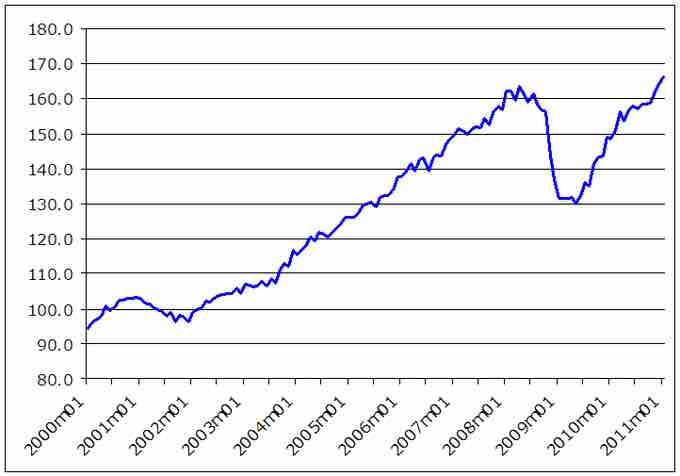The Global Recession
The 2008–2012 global recession is a massive global economic decline that began in December 2007 and took a particularly sharp downward turn in September 2008. No economic recession since The Great Depression of the 1930s has affected economic input, production and circulation of capital like the current global recession. The global recession affected the entire world economy, hitting some countries more than others. It is a major global recession characterized by various systemic imbalances sparked by the outbreak of the Financial crisis of 2007–2008. shows the trend in international trade that reflects the recession in 2008.

World Trade
Evolution of international trade since 2000. There exists a dip in 2009 that corresponds to the recession of 2008.
Beginning February 26, 2009 an Economic Intelligence Briefing was added to the daily intelligence briefings prepared for the President of the United States. This addition reflects the assessment of United States intelligence agencies that the global financial crisis presents a serious threat to international stability.
Causes
The bursting of the U.S. housing bubble, which peaked in 2006, caused the values of securities tied to U.S. real estate prices to plummet, damaging financial institutions globally. The financial crisis was triggered by a complex interplay of government policies that encouraged home ownership, providing easier access to loans for subprime borrowers, overvaluation of bundled sub-prime mortgages based on the theory that housing prices would continue to escalate, questionable trading practices on behalf of both buyers and sellers, compensation structures that prioritize short-term deal flow over long-term value creation, and a lack of adequate capital holdings from banks and insurance companies to back the financial commitments they were making.
Several causes of the financial crisis have been proposed, with varying weights assigned by experts. The U.S. Senate's Levin–Coburn Report asserted that the crisis was the result of "high risk, complex financial products; undisclosed conflicts of interest; the failure of regulators, the credit rating agencies, and the market itself to rein in the excesses of Wall Street. " The 1999 repeal of the Glass–Steagall Act effectively removed the separation between investment banks and depository banks in the United States. Critics argued that credit rating agencies and investors failed to accurately price the risk involved with mortgage-related financial products, and that governments did not adjust their regulatory practices to address 21st-century financial markets. Research into the causes of the financial crisis has also focused on the role of interest rate spreads.
Political Consequences
In March 2009, Business Week stated that global political instability is rising fast due to the global financial crisis and is creating new challenges that needed to be addressed. The Associated Press reported in March 2009 that: United States "Director of National Intelligence Dennis Blair has said the economic weakness could lead to political instability in many developing nations. " Even some developed countries are experiencing political instability. NPR reports that David Gordon, a former intelligence officer who now leads research at the Eurasia Group, said: "Many, if not most, of the big countries out there have room to accommodate economic downturns without having large-scale political instability if we're in a recession of normal length. If you're in a much longer-run downturn, then all bets are off."
In January 2009, the government leaders of Iceland were forced to call elections two years early after the people of Iceland staged mass protests and clashed with the police due to the government's handling of the economy. Hundreds of thousands protested in France against President Sarkozy's economic policies. Prompted by the financial crisis in Latvia, the opposition and trade unions there organized a rally against the cabinet of premier Ivars Godmanis. The rally gathered some 10-20 thousand people. In the evening the rally turned into a Riot. The crowd moved to the building of the parliament and attempted to force their way into it, but were repelled by the state's police. In late February many Greeks took part in a massive general strike to protest the economic situation and they shut down schools, airports, and many other services in Greece. Communists in Moscow also rallied to protest the Russian government's economic plans. Protests have also occurred in China as demands from the west for exports have been dramatically reduced and unemployment increased. Beyond these initial protests, the protest movement has grown and continued in 2011. In late 2011, the Occupy Wall Street protest took place in the United States, spawning several offshoots that came to be known as the Occupy movement.
In 2012 the economic difficulties in Spain have caused support for secession movements to increase. In Catalonia support for the secession movement exceeded 50%, up from 25% in 2010. On September 11, a pro-independence march, which in the past had never drawn more than 50,000 people, pulled in a crowd estimated by city police at 1.5 million..